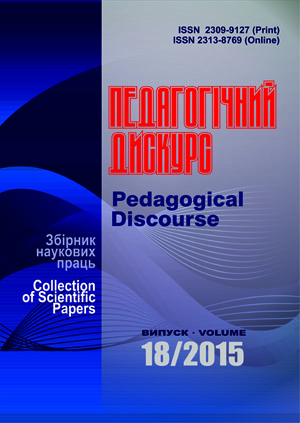Science and Theoretic Essence Self-Organization Skills in Context of Teaching
Abstract
The article deals with the results of the essence of the concept «self-organization» in scientific literature, learning different directions of scientific ways for analysis of this phenomenon functioning in the teaching context, which became the subject of profound interest of various sciences. Self-organization in general is considerd as ability to self-regulation of natural, person’s psychotic conditions, and his or her qualites. It is realized by the volitional and intellectual mechanisms, it is developed in the motives of behaviour and realized in regulated activity.
The teaching subjects self-organization skills are in the middle of science and sense area phenomenon, which is essenced, it is presented as the result of theoretic interpretations and practice using general components this kind of self-doing person. It is taken into account that effectiveness of social self-organization depends on many personal qualites. The basic of them, which help for self-organization development are revealed, among them determination, self-analysis, self-regulation, skills of foresee, independence, energetic.
Downloads
References
Afanas'eva N. A. Samoorganizaciya – faktor uspeshnosti uchebnoj dejatel'nosti, Fundamental'nyʼe issledovaniya, 2008, № 2, pp. 60–61.
Bobrova L. Ju. Zhiznennyʼe cennosti i kompetencii samoorganizacii studentov kak faktory professional'nogo razvitiya samosoznaniya, Nauchnyj potencial regionov na sluzhbu modernizacii, Astrahan' : AISI, 2012, № 1 (2), pp. 219–222.
Derkach A. A. Akmeologichekie osnovy razvitiya professionala, Moscow, Izd-vo Mosk. psihologo-soc. inst-ta. – Voronezh : NPO «MODJeK», 2004, 752 s.
Dudnik N. Iu. Strukturuvannia systemy umin profesiinoi samoorhanizatsii maibutnoho vchytelia, Pedahohika vyshchoi ta serednoi shkoly: zb. naukovykh prats Kryvorizkoho derzhavnoho pedahohichnoho universytetu, Kryvyi Rih : [b. v.], 2009, pp. 99–105.
D'yachenko M. I. Kratkij psihologicheskij slovar : Samoorganizaciya, Minsk : Hjelton, 1998, 399 p, p. 45.
Ishkov A. D. Vliyanie struktury processa samoorganizacii na uspeshnost' uchebnoj deyatel'nosti studentov, Moscow, 2004, 19 p.
Klimov E. A. Psihologiya professional'nogo samoopredeleniya. Rostov-na-Donu, 1996, 509 p..
Novyʼj yʼnciklopedicheskij slovar', Moscow, Bol'shaya Rossijskaya jenciklopediya, 2000, 1656 p.
Filonenko V. A. Aktualizatsiya professionalnoj samoorhanyzatsii budushhego spetsyalista v usloviyax sovremennogo vyʼsshego professyonalnogo obrazovanyya [Electronic resource], mode of access : http://yspu.org/conferences/Training_managers/15_FilonenkoVA.doc.
Cagarelli Ju. A. Processyʼ samoorganizacii, samoupravleniya, samoregulyacii v muzykal'noj deyatel'nosti, Teoreticheskie i prikladnyʼe issledovaniya psihicheskoj samoregulyacii: Tezisy dokladov nauchnoj konferencii, Kazan', KGU, 1982, pp. 11–13.

This work is licensed under a Creative Commons Attribution-NonCommercial-ShareAlike 4.0 International License.

















